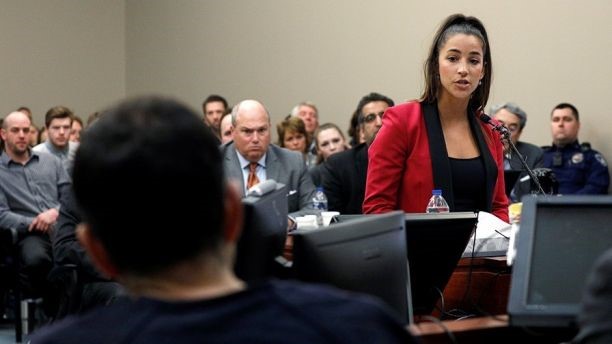Why is the world so lacking in moral courage?
February 6, 2018
|
Michael K. Shaub

Olympic Gymnast Aly Raisman Confronts Larry Nassar (Fox News)
Why do we scratch our heads and say, “How did Olympic gymnastics doctor Larry Nassar get away with his morally repugnant and abusive behavior for so long?” “Why did people enable movie mogul Harvey Weinstein’s egregious behavior, not just ignoring it, but facilitating it?” “Why did no one speak up when the police from my home town, Baltimore, allegedly carried around toy guns and BB guns to plant on people they happened to shoot?”
Moral courage is the willingness to take a potentially costly moral action simply because it is your duty to do so, or “the right thing to do.” It is acting in spite of the personal consequences because of the harm that can be prevented or good provided to others. Moral courage is what turns moral judgment into moral action.
We make moral decisions based on duties and consequences. When people are condemned for their moral decisions, it is largely because they did not recognize duties or because they miscalculated consequences to themselves and others.
Most people calculate consequences in moral decisions, unless those calculations are suppressed by passion or anger. Often people neglect to consider duties, especially when consequences to them are significant. Duties arise typically from rights and justice considerations. Jury duty arises because people have the right to a trial by jury. Or a moral intervention may be required in order to see that people are treated fairly in a situation.
What stops us
Two of the primary inhibitors of moral courage are the fear of consequences and misplaced duties. The first inhibitor is obvious, but fear of consequences may inhibit moral action even by those who actually recognize duties. The second inhibitor is often underestimated. Duty to a team, a friend, or a cause may prevent someone from acting who is morally uneasy about a situation. This behavior is evident in retrospect for most sexual assault scandals around college athletic teams. It seems inexplicable that teammates who are not even engaged in the behavior not only fail to report it, but stand by while it is happening right in front of them or in the next room. As this behavior is treated as normal on college campuses, and not just with athletes, moral courage is short-circuited.
Two of the primary enablers of moral courage are exemplars and express permission provided by influential people. The Olympic gymnastics scandal is a classic example of how the floodgates of moral courage can be opened if one or two people step out and confront egregious behavior. The sentencing phase of Larry Nassar’s trial consisted of a series of women able to overcome their feelings of personal shame and bring to the light the massive harm caused by someone they trusted. This happens in the business world when whistleblowers like Cynthia Cooper at WorldCom reveal what is going on in a corporation to mislead financial statement users, despite consequences.
What we see less frequently is the other empowering force for moral courage—express permission to speak out against moral wrongs. Most in power are reluctant to grant this permission, even when they themselves are not engaged in bad behavior, because of the uncertainty of the consequences that can arise from empowering others. If moral wrong has been buried for a long time, revealing it can result in rapidly multiplying harm to an organization, as both USA Gymnastics and Michigan State University are likely about to find out. It is this potential, and not just the consequences to an individual, that can make a leader hesitate, or a whistleblower reluctant to speak.
A wise leader continually probes the organization with professionally skeptical questions, rather than just believing assertions about performance. This can be done with moral issues as well, gauging the organization’s potential exposure to everything from a harassment suit to bribery allegations. Finding things early is a little like letting the air slowly out of a balloon rather than having to pop it later. A wise leader minimizes the need for significant moral courage in the organization by proactively searching out potentially dysfunctional behavior.
And that wise leader knows that it takes more than one set of eyes to detect moral dysfunction. That type of leader grants express permission for people to engage in uncomfortable conversations to short circuit major moral failures.
Granting this permission to speak, and calling out those who are engaged in bullying subordinates to adopt misplaced duties to the team or the organization, is how a leader becomes a moral exemplar. This type of leader empowers the moral courage that turns moral judgment into moral action.
Because, in the end, moral courage is an individual decision, and it is rare. We do well to minimize the situations in which it is necessary. We do better to act intentionally to enable moral courage when it is required.


